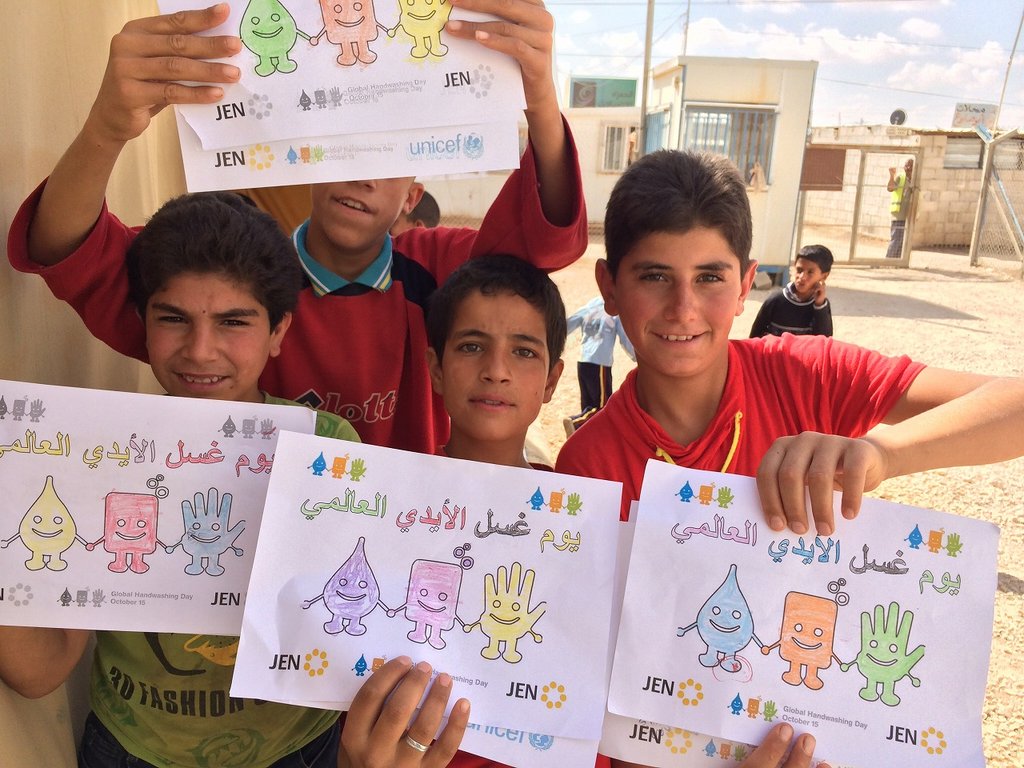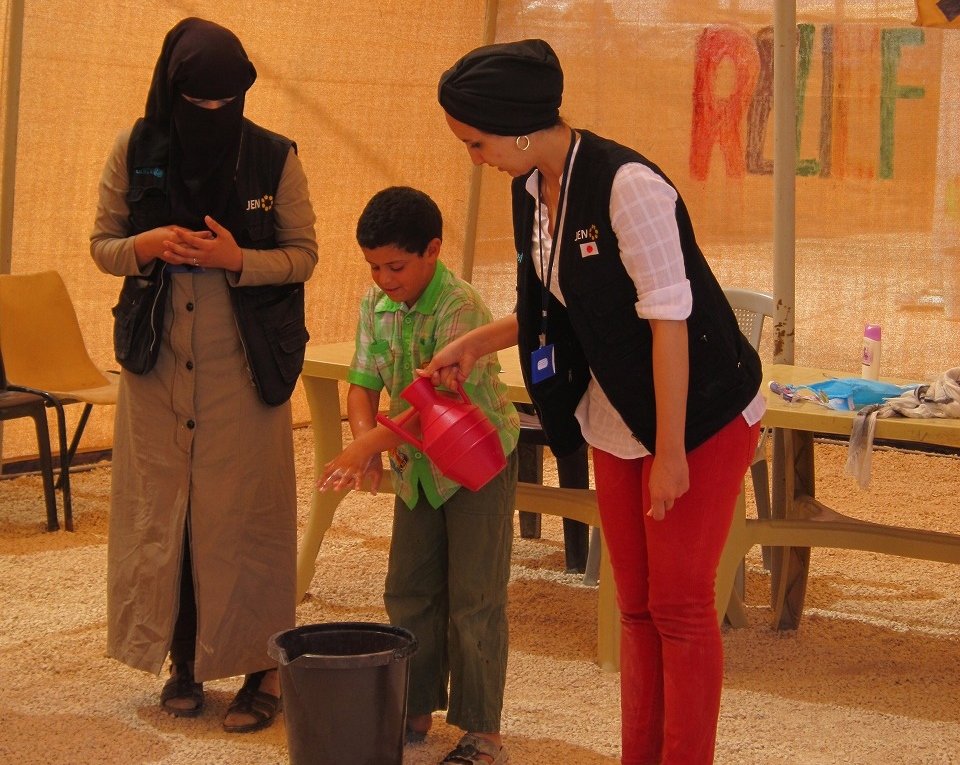By Miyako Hamasaka | PR Manager
“Water means life, health and prosperity,” said a young participant at a three-day campaign on the occasion of World Water Day on Sunday, March 22nd World. “I believe this event tackled an important issue to those who live in the camp whether we stay at Za’atari camp or go back to Syria,” he explained.
The awareness campaign, organized by JEN, was launched at Za’atari camp for Syrian refugees with the theme of water and the need to protect and conserve water. The campaign included the publication of two main messages: “For better health, we need clean water. Let’s keep the water clean”, and “Water is for you and others; don’t waste it”. The campaign targeted males and females from three age groups: Adults, teenagers and children. Three different methods were used to deliver the above messages in accordance with each age group.
For Adults: Group sessions were held with refugees from both genders. During those sessions, awareness messages were discussed with the refugees through two key points: Ensuring that water is always clean and the knowledge that the share amount of water is 35 liters per day per person. Also they were informed about how to save water by re-using the drainage water after cleaning the dishes to clean the floor. During the sessions, trainers received positive feedback from the attendees regarding the value of saving water, especially when someone referred to the issue of water shortage in Jordan compared to Syria. They also realized that water resources in Jordan are not as abundant as they used to be in their own country, which reflected positively on their behavior in daily water use. In addition, the process of water testing for safety and cleanliness in the camp was discussed. Attendees indicated that they are confident of the water quality provided to them.
For Teenagers: Many group sessions and activities targeted 14 – 18 year-old teens. Activities included a contest that aimed to raise awareness for water conservation by letting them pour the water from a big bucket to many cups without spilling any water on the floor. The winner won a site visit to the water borehole inside Za’atari camp to see the borehole operation and filling the water into the trucks.
For Children: Many games and activities were played to deliver messages in the simplest ways to the kids. The games and activities that were held were face painting, a play performance, songs and drawing.
Most of the refugees who attended this event said that such activities had positive influence on their children and encouraged them to adopt new habits concerning the usage of water.
Menstrual hygiene sessions for women in Za'atari camp (Part 2)
The Community Hygiene Promoters invited 8 -10 women to participate in the session. Sometimes the sessions are held at JEN’s community center and sometimes at the hygiene promoter’s household. Generally one or two of the JEN staff attend the sessions to support the hygiene promoter.
During the sessions, the women learn much new information. There are a lot of myths and misconceptions about how they can care for themselves in a hygienic way. Many women began to understand the workings of their bodies each month for the first time. They also inquired many questions that went beyond our hygiene sessions, so we referred them to the doctors in the camp. The women were extremely interested in learning about this topic.
At the end of the session each woman received a hygiene kit that was donated to JEN by UN Women. It contained many supplies that can be used for self-care and also items used for house-cleaning.
What are the most surprising things we learned through creating these sessions?
Originally we thought that women would not be interested, and that they would already know everything we had to offer. However, we quickly found out that some of them had numerous questions. One interesting myth that came up is related to food; some women thought that eating certain foods like lemon, onion, or coffee would be harmful, and they also tend to stop cooking during menstruation fearing that the food would be spoiled for their families. The CHPs have become experts at uncovering myths and providing facts.
What will we do next?
The menstrual hygiene topic was so popular that many more women have asked to volunteer as Community Hygiene Promoters with JEN. Two weeks ago, we conducted an orientation session with 16 new volunteers. Now they know the general topics of how to communicate, how diarrhea spreads, and how to hand wash properly. The women who are already giving menstrual hygiene sessions are also seeking other topics to discuss. We have already begun developing training sessions for them about dental hygiene and after that we will decide on the messages about water conservation.
Project reports on GlobalGiving are posted directly to globalgiving.org by Project Leaders as they are completed, generally every 3-4 months. To protect the integrity of these documents, GlobalGiving does not alter them; therefore you may find some language or formatting issues.
If you donate to this project or have donated to this project, you can receive an email when this project posts a report. You can also subscribe for reports without donating.

